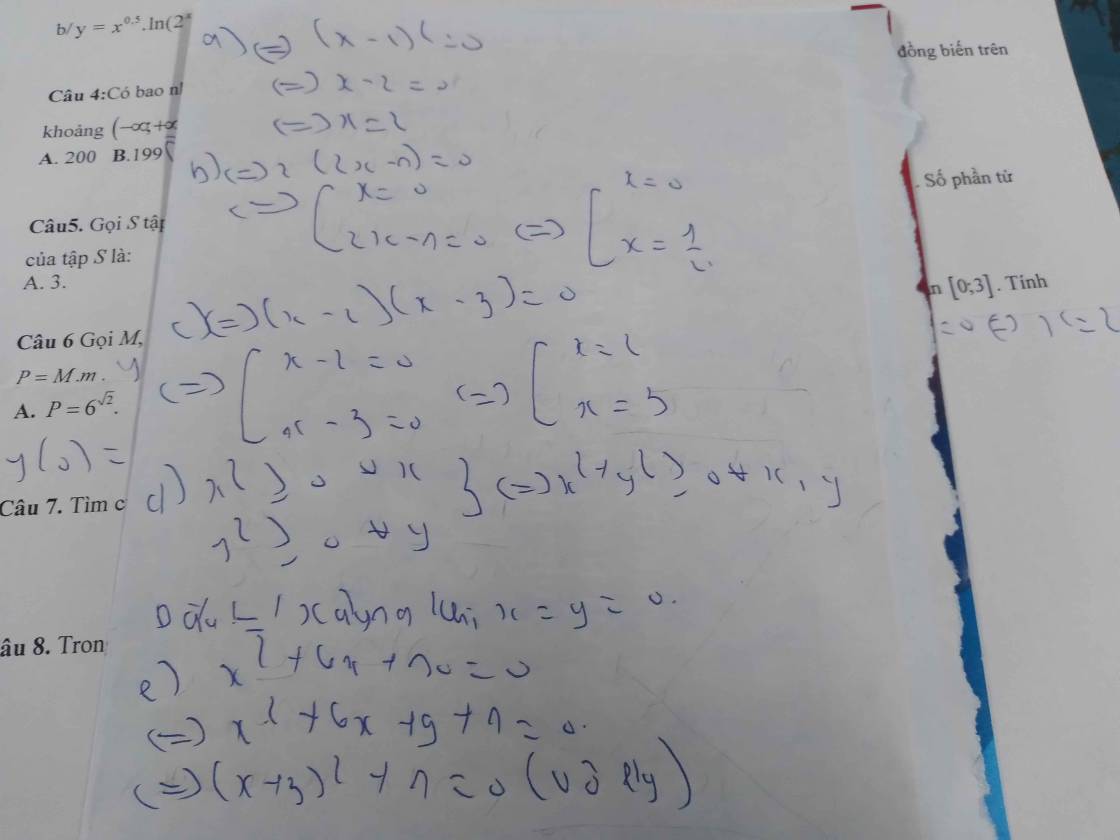C = 2x2 - 4x + 6 > 0
Hãy nhập câu hỏi của bạn vào đây, nếu là tài khoản VIP, bạn sẽ được ưu tiên trả lời.


\(a,\Leftrightarrow\left(2x-3\right)\left(x+2\right)=0\Leftrightarrow\left[{}\begin{matrix}x=\dfrac{3}{2}\\x=-2\end{matrix}\right.\\ b,\Leftrightarrow x^3-27-x^3+4x=1\\ \Leftrightarrow4x=28\Leftrightarrow x=7\\ c,\Leftrightarrow4x^2-4x-8=0\\ \Leftrightarrow x^2-x-2=0\\ \Leftrightarrow\left(x-2\right)\left(x+1\right)=0\Leftrightarrow\left[{}\begin{matrix}x=2\\x=-1\end{matrix}\right.\\ d,\Leftrightarrow2x^2+6x+x+3=0\\ \Leftrightarrow\left(x+3\right)\left(2x+1\right)=0\Leftrightarrow\left[{}\begin{matrix}x=-3\\x=-\dfrac{1}{2}\end{matrix}\right.\)

casio fx 570 thì ấn mode => 5 => 3 sau điền hệ số a;b;c
casio fx 580 thì ấn mode => 9 => 2 => 2 => điền hệ số a;b;c
có cả cách này à =)))
menu setup -> 9 -> 2 - > 2 (pt cần phân tích) -> nhập hệ số của pt vào từng biến thích hợp -> ''=''
VD : \(A=x^2+4x-5\)có nghiệm \(x_1=1;x_2=-5\)
vậy đa thức cần phân tích là : \(\left(x-1\right)\left(x+5\right)=x^2+5x-x-5\)
Vậy \(A=x^2+4x-5=x^2+5x-x-5=\left(x-1\right)\left(x+5\right)\)
tương tự nhé

a: \(\Leftrightarrow\left(-x+3\right)\left(x+6\right)=18\)
\(\Leftrightarrow-x^2-6x+3x+18-18=0\)
\(\Leftrightarrow-x\left(x+3\right)=0\)
=>x=0 hoặc x=-3
b: \(\Leftrightarrow x\left(3x^2+6x-4\right)=0\)
\(\Leftrightarrow\left[{}\begin{matrix}x=0\\3x^2+6x-4=0\end{matrix}\right.\Leftrightarrow\left[{}\begin{matrix}x=0\\x^2+2x-\dfrac{4}{3}=0\end{matrix}\right.\)
\(\Leftrightarrow\left[{}\begin{matrix}x=0\\\left(x+1\right)^2=\dfrac{7}{3}\end{matrix}\right.\Leftrightarrow x\in\left\{0;\dfrac{\sqrt{21}}{3}-1;\dfrac{-\sqrt{21}}{3}-1\right\}\)
c: =>x(3x-5)=0
=>x=0 hoặc x=5/3
d: =>(x-2)(x+2)=0
=>x=2 hoặc x=-2

\(a.\left(x^2-2x+1\right)-4=0\\\Leftrightarrow \left(x-1\right)^2-2^2=0\\\Leftrightarrow \left(x-1-2\right)\left(x-1+2\right)=0\\ \Leftrightarrow\left(x-3\right)\left(x+1\right)=0\\\Leftrightarrow \left[{}\begin{matrix}x-3=0\\x+1=0\end{matrix}\right.\Rightarrow\left[{}\begin{matrix}x=3\\x=-1\end{matrix}\right.\)
Vậy tập nghiệm của phương trình trên là \(S=\left\{3;-1\right\}\)
\(b.x^2-x=-2x+2\\\Leftrightarrow x^2-x+2x-2=0\\\Leftrightarrow x\left(x-1\right)+2\left(x-1\right)=0\\\Leftrightarrow \left(x+2\right)\left(x-1\right)=0\\\Leftrightarrow \left[{}\begin{matrix}x+2=0\\x-1=0\end{matrix}\right.\Rightarrow\left[{}\begin{matrix}x=-2\\x=1\end{matrix}\right.\)
Vậy tập nghiệm của phương trình trên là \(S=\left\{-2;1\right\}\)
\(c.4x^2+4x+1=x^2\\ \Leftrightarrow4\left(x^2+x+\frac{1}{4}\right)-x^2=0\\ \Leftrightarrow4\left(x+\frac{1}{2}\right)^2-x^2=0\\ \Leftrightarrow\left[2\left(x+\frac{1}{2}\right)-x\right]\left[2\left(x-\frac{1}{2}\right)+x\right]=0\\ \Leftrightarrow\left[{}\begin{matrix}2\left(x+\frac{1}{2}\right)-x=0\\2\left(x+\frac{1}{2}\right)+x=0\end{matrix}\right.\Rightarrow\left[{}\begin{matrix}2x+1-x=0\\2x+1+x=0\end{matrix}\right.\Rightarrow\left[{}\begin{matrix}x=-1\\x=-\frac{1}{3}\end{matrix}\right.\)
Vậy tập nghiệm của phương trình trên là \(S=\left\{-1;-\frac{1}{3}\right\}\)

\(a.x^2-4x+4=0\)
\(\left(x-2\right)^2=0\)
=>x=2
b) \(2x^2-x=0\)
\(x\left(2x-1\right)=0\)
=> \(\left[{}\begin{matrix}x=0\\x=\dfrac{1}{2}\end{matrix}\right.\)
c) \(x^2-5x+6=0\)
\(x^2-2x-3x+6=0\)
\(\left(x-2\right)\left(x-3\right)=0\)
=> \(\left[{}\begin{matrix}x=2\\x=3\end{matrix}\right.\)
d) \(x^2+y^2=0\)
Vì \(x^2,y^2\ge0\forall x,y\)
=>x=y=0
e) \(x^2+6x+10=0\)
\(\left(x+3\right)^2+1=0\)
Vì \(\left(x+3\right)^2\ge0\forall x\)
=> VT>0 \(\forall x\)
=> phương trình vô nghiệm

3x2 + 2x - 1 = 0
=> 3x2 + 3x - x - 1 = 0
=> 3x(x + 1) - (x + 1) = 0
=> (3x - 1)(x + 1) = 0
=> \(\orbr{\begin{cases}3x-1=0\\x+1=0\end{cases}}\)
=> \(\orbr{\begin{cases}x=\frac{1}{3}\\x=-1\end{cases}}\)
x2 - 5x + 6 = 0
=> x2 - 2x - 3x + 6 = 0
=> x(x - 2) - 3(x - 2) = 0
=> (x - 3)(x - 2) = 0
=> \(\orbr{\begin{cases}x-3=0\\x-2=0\end{cases}}\)
=> \(\orbr{\begin{cases}x=3\\x=2\end{cases}}\)
3x2 + 7x + 2 = 0
=> 3x2 + 6x + x + 2 = 0
=> 3x(x + 2) + (x + 2) = 0
=> (3x + 1)(x + 2) = 0
=> \(\orbr{\begin{cases}3x+1=0\\x+2=0\end{cases}}\)
=> \(\orbr{\begin{cases}x=-\frac{1}{3}\\x=-2\end{cases}}\)
1, \(3x^2+2x-1=0\Leftrightarrow3x^2+3x-x-1=0\)
\(\Leftrightarrow3x\left(x+1\right)-\left(x+1\right)=0\)
\(\Leftrightarrow\left(x+1\right)\left(3x-1\right)=0\)
\(\Leftrightarrow\orbr{\begin{cases}x+1=0\\3x-1=0\end{cases}\Leftrightarrow\orbr{\begin{cases}x=-1\\x=\frac{1}{3}\end{cases}}}\)
2, \(x^2-5x+6=0\Leftrightarrow x^2-2x-3x+6=0\)
\(\Leftrightarrow x\left(x-2\right)-3\left(x-2\right)=0\)
\(\Leftrightarrow\left(x-2\right)\left(x-3\right)=0\)
\(\Leftrightarrow\orbr{\begin{cases}x-2=0\\x-3=0\end{cases}\Leftrightarrow\orbr{\begin{cases}x=2\\x=3\end{cases}}}\)
3, \(3x^2+7x+2=0\Leftrightarrow3x^2+6x+x+2=0\)
\(\Leftrightarrow3x\left(x+2\right)+\left(x+2\right)=0\)
\(\Leftrightarrow\left(x+2\right)\left(3x+1\right)=0\)
\(\Leftrightarrow\orbr{\begin{cases}x+2=0\\3x+1=0\end{cases}\Leftrightarrow\orbr{\begin{cases}x=-2\\x=-\frac{1}{3}\end{cases}}}\)


Ta có:
\(C=2x^2-4x+6\)
\(C=2\cdot\left(x^2-2x+3\right)\)
\(C=2\cdot\left(x^2-2x+1+2\right)\)
\(C=2\cdot\left[\left(x-1\right)^2+2\right]\)
\(C=2\left(x-1\right)^2+4\)
Mà: \(2\left(x-1\right)^2\ge0\forall x\)
\(\Rightarrow C=2\left(x-1\right)^2+4\ge4>0\forall x\)
Vậy tất cả các số thực đều thỏa mãn:
\(\Rightarrow x\in R\)
`C = 2x^2 - 4x + 6`
`2C = 4x^2 - 8x + 12`
`2C = ( 2x )^2 - 2 . 2x . 2 + 2^2 + 12 - 2^2`
`2C = ( 2x - 2 )^2 + 8`
Vì ` ( 2x - 2 )^2 >= 0 AAx` nên :
`( 2x - 2 )^2 + 8 >= 8 > 0 AAx`
Hay `2C > 0 AAx` . Vì `2C > 0 AAx => C > 0 AAx` .
Vậy `C > 0 AAx` ( đpcm ) .